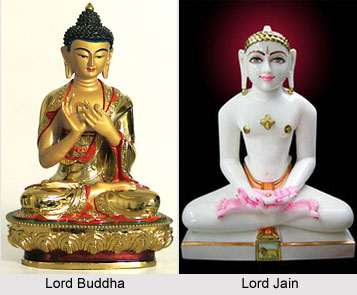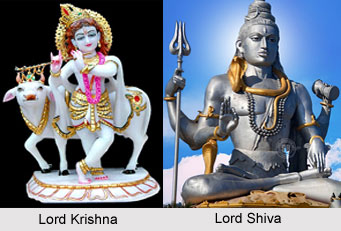 Religious Elements in Mythology thrives to be the very base of Indian culture. Myth is a reality that has been entwined to the raptures of time, space and consciousness. Myth is history, not coloured by historical probabilities or possibilities rather mapped by the folklores and fanned by consciousness of time. Myth is cosmogonist narrative in detailed version connected with the cultural origin and the factors associated with the same. They are even interpreted as the symbolic tales from the past often primordial times concerning cosmology. Indian Mythology encompasses a wide field of myths and legends concerning Indian religion. Starting from the life saga of Lord Krishna, to Lord Shiva, or Ganesha, they even include the mythical characters, events, from Ramayana, Mahabharata or the Vedas.
Religious Elements in Mythology thrives to be the very base of Indian culture. Myth is a reality that has been entwined to the raptures of time, space and consciousness. Myth is history, not coloured by historical probabilities or possibilities rather mapped by the folklores and fanned by consciousness of time. Myth is cosmogonist narrative in detailed version connected with the cultural origin and the factors associated with the same. They are even interpreted as the symbolic tales from the past often primordial times concerning cosmology. Indian Mythology encompasses a wide field of myths and legends concerning Indian religion. Starting from the life saga of Lord Krishna, to Lord Shiva, or Ganesha, they even include the mythical characters, events, from Ramayana, Mahabharata or the Vedas.
India is a country of diverse religious practices and socio-cultural habits which incorporates a saga of a nation with a vivid religious background. Indian mythology takes into consideration all those myths related to Hindu, Buddhist, Jain and some other scriptures.
 Indian mythology is among the richest elements of Indian culture. Vedas in India are important in shaping not only the culture but also the mythology of India. Through generations either by word of mouth or carefully stored scriptures, stories of Indian mythology have been passed down. Indian mythology is inseparable from Indian religion; the myths are religious accounts of gods and goddesses for many millions of people. The oral transmission of the stories could be trusted due to the strong religious aspects. Like Hindu mythology, Buddha mythology too is a part of Indian mythology. Myths and legends related to Buddha are contained in Jatakas` which were tales. Stories of his birth, life, attainment of Nirvana are an integral part of the mythology. Similarly stories about Mahavira the founder of Jainism are also popular in the same manner. His birth and life is in various myths which are again a part of the Indian mythology, since there is a following of Jainism in India. The epics are set in different "yugas" or periods of time in Hindu Mythology. Where Ramayana, describes the life and times of Lord Rama (the seventh avatar of Lord Vishnu) and occurs in the Treta yuga and the Mahabharata describes the life and times of the Pandavas, occurs in the Dwapara yuga, a period in which Lord Krishna (the eighth avatar of Lord Vishnu) took birth. The religious features of faith, belief, and devotion are joined with these mythical characters in an autonomous way.
Indian mythology is among the richest elements of Indian culture. Vedas in India are important in shaping not only the culture but also the mythology of India. Through generations either by word of mouth or carefully stored scriptures, stories of Indian mythology have been passed down. Indian mythology is inseparable from Indian religion; the myths are religious accounts of gods and goddesses for many millions of people. The oral transmission of the stories could be trusted due to the strong religious aspects. Like Hindu mythology, Buddha mythology too is a part of Indian mythology. Myths and legends related to Buddha are contained in Jatakas` which were tales. Stories of his birth, life, attainment of Nirvana are an integral part of the mythology. Similarly stories about Mahavira the founder of Jainism are also popular in the same manner. His birth and life is in various myths which are again a part of the Indian mythology, since there is a following of Jainism in India. The epics are set in different "yugas" or periods of time in Hindu Mythology. Where Ramayana, describes the life and times of Lord Rama (the seventh avatar of Lord Vishnu) and occurs in the Treta yuga and the Mahabharata describes the life and times of the Pandavas, occurs in the Dwapara yuga, a period in which Lord Krishna (the eighth avatar of Lord Vishnu) took birth. The religious features of faith, belief, and devotion are joined with these mythical characters in an autonomous way.
Hindu mythology has the concept of fourteen worlds (not planets) - seven higher worlds (heavens) and seven lower ones (hells). Different deities play their part in ruling these worlds. Like the god of death, lord of justice, and so on. There is a great deal of discussion about the soul, good and bad deed, Moksha - the state free from the cycle of death and birth, beyond the fourteen worlds. Divine incarnation is another feature of Hindu mythology, fish, turtle, narasimha and many others. These concepts of mythology are in sync with the religious aphorisms. Characters and incidents of these texts in actuality create myth. Religious texts create myth and lay bare the mythical foundations of the religiosity.




















